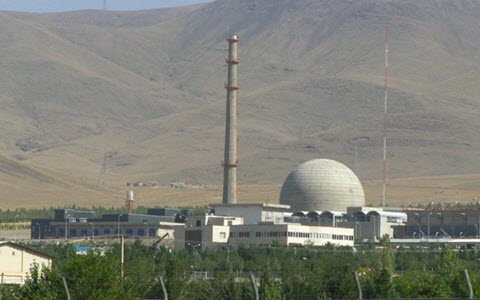NCRI - Donald Trump is reportedly gathering any reason he can to decertify Iran’s compliance with the nuclear deal come October and one defence expert has voiced his support for Trump’s plans.
Peter Brookes, a Heritage Foundation senior fellow and a former deputy assistant secretary of defense, wrote an op-ed for the
Boston Herald in which he assessed that the 2015 nuclear deal (formally known as the Joint Comprehensive Plan of Action) was a “ticking time bomb” that “could explode [at] any time”.
On October 15, the White House will have to verify to Congress that the Iranian Regime is in compliance with the nuclear deal.
This will be hard to do given the recent
admission from the International Atomic Energy Agency that they can’t verify Iran’s full compliance and Trump’s extremely vocal opposition to the deal, having called it an “embarrassment” and the “worst deal ever” at the United Nations General Assembly last week.
Brookes wrote: “Trump also said he’d made up his mind about what to do about it — though he didn’t tip his hand as to what exactly that was. If I had to bet, it isn’t a continuation of the status quo. Considering the deal’s shortcomings, that’s understandable.”
Some defenders of the deal have argued that the deal should be kept in place because it slows down Iran’s development of nuclear weapons for another decade, but Brooke argues that its end date is one of the key problems with the pact.
He wrote: “The deal has a “sunset provision,” which is when key restrictions on Iran’s uranium enrichment program are phased out, leaving Tehran footloose and fissile free to build a bomb. Indeed, President Obama acknowledged in a 2015 NPR interview that after vital restrictions in the deal expire at the 15-year mark, Tehran could produce enough fissile material for a bomb in no time. Isn’t that comforting?”
The Iranian Regime has previously claimed that the nuclear programme is peaceful, which begs the question, “how?”
Also for a peaceful programme, the mullahs certainly went through an awful lot of trouble to keep it a secret by keeping factories underground and in other countries. Even after discovery and the agreement to stop, the Regime has prevented the IAEA from accessing certain sites that are believed to have been used for nuclear purposes.
Brookes wrote: “Tell me: How can you feel confident in verifying compliance with the agreement based on limited inspection rights — on top of two decades of Iranian denials and deception on its atomic activities? Uh, you can’t.”
On top of that, Iran is still allowed to conduct centrifuge research, support terrorists, destabilise the Middle East, continue its ballistic missile programme, and work with North Korea.
Brookes wrote: “Even if Tehran is currently in technical compliance, the pact leaves Iran as a “threshold” nuclear state and won’t stop it from becoming a de facto nuclear power in the not-too-distant future. It’s no wonder that Team Trump may soon call for a deal do-over.”




Comments
Post a Comment